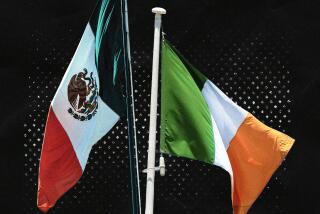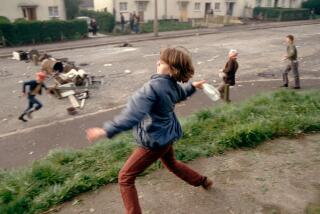NONFICTION - Nov. 15, 1992
- Share via
THE MAN WHO MADE IRELAND: The Life and Death of Michael Collins by Tim Pat Coogan (Roberts Rinehart: $24.95; 480 pp.). G. K. Chesterton is best remembered for his Father Brown detective stories, but his most influential book may be “The Man Who Was Thursday”--if only because it was read by Michael Collins (1890-1922), one of the most prominent martyrs to the Irish cause of self-determination. In the Chesterton novel an anarchist explains his longevity by saying, “If you don’t seem to be hiding, nobody hunts you out,” and Collins faithfully followed that advice in running the guerrilla operation against the British between the Easter Rising of 1916 and the establishment of the Irish Free State in 1922. Tim Pat Coogan’s thoroughly researched biography shows Collins to have been a charismatic leader in whom “humanity and generosity ran side by side with the most ruthless militarism and political chicanery,” the “Big Fella” being able to dispense relief aid to compatriots and execute loyalist informers with equal aplomb. Collins made his name as a sort of Scarlet Pimpernel, eluding capture by British authorities despite overseeing his Dublin intelligence network from a bicycle seat. He is known today as much for his death and diplomacy as for his espionage. Collins became a statesman much against his will, telling future Irish President Eamon de Valera that his going to the negotiating table in London in 1921 would reveal “the common clay of which I am made,” yet he did a reasonable job despite the fact that the Anglo-Irish treaty resulted in civil war--war that claimed Collins’ life in an ambush a few months later. “The Man Who Made Ireland” is as much about Irish politics as it is about Collins, Coogan seeming unable to leave out any conceivably relevant detail, but his reporting is so comprehensive, and his writing sufficiently sprightly, that the book doesn’t bore. De Valera--who saved his political hide by remaining in Dublin during the treaty negotiations--was a dominant force in Ireland for more than 50 years after Collins’ death, yet he believed, as Coogan notes in closing this biography, that “in the fullness of time history will record the greatness of Collins and it will be recorded at my expense.”
More to Read
Sign up for our Book Club newsletter
Get the latest news, events and more from the Los Angeles Times Book Club, and help us get L.A. reading and talking.
You may occasionally receive promotional content from the Los Angeles Times.







